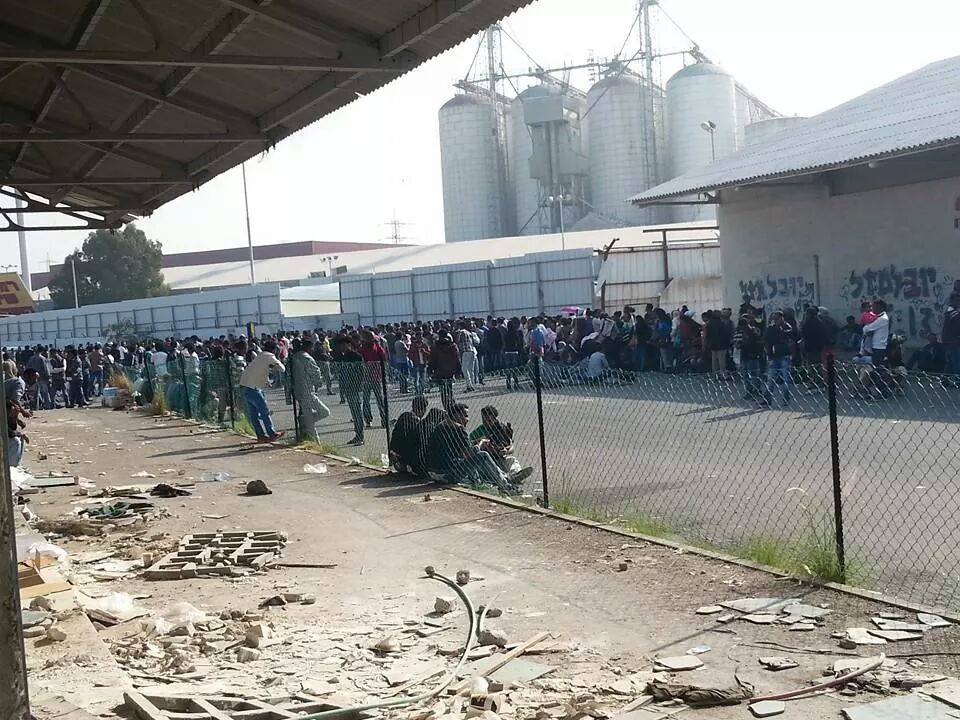Refugees Forced to Wait in Lines for Days to Renew Visas
“On Tuesday, my visa ran out. My employer told me that I cannot work without a visa for even just one day, so I went on Monday to the new Ministry of Interior [MoI] office in Bnei Brak. I heard from friends that there are long lines, so I got there early, 5:30 in the morning. I received the queue number 768. There were no chairs. It was very crowded, about 800 Eritreans and Sudanese waited there. Women, many children and babies in strollers. When you wait for so many hours, children want to go to the bathroom, but there was none. You have to look for a private spot so no one sees you. Like animals. The children became thirsty after the water they brought had run out and there’s no place to get water. At 16:00, the MoI clerks told us to go home. “No more visas.” About 500 people who had queue numbers were not given visas. We went home. The next day, on Tuesday, I returned with my number and even though there were hundreds of new people, the first accepted the people who had numbers from yesterday. I was lucky. I got a visa for two more months. My employer is angry with me and doesn’t realize how lucky I was to receive a visa so quickly. He’s angry with me and wants to fire me whenever it takes a few days to get a visa.”
This is how Simon, an asylum-seekers from Eritrea, described the struggle to have his stay permit renewed in the Bnei Brak MoI office. The stay permit, a conditional release visa, grants the 42,000 asylum-seekers holding it no social rights and only protects them from forcible deportation.
Simon is indeed lucky. He lives in Tel Aviv and for the price of four bus tickets and two days of work, he managed to obtain a visa that will allow him to work for two whole months. Among the hundreds of Eritrean and Sudanese who waited outside the MoI office many arrived from all over Israel after they’ve paid for pricey public transportation to a remote corner of Bnei Brak. Many of them spend numerous days trying to get the coveted visa, and lose more that two days of work.
In early 2014, the MoI greatly reduced the hours of operation and number of offices in which asylum-seekers can renew their visas from 24 to just four. Due to intense criticism from the media and Israelis who encountered the long lines outside their workplaces, two more offices were opened. In March 2014, following a report published by the Hotline and a hearing held at the Committee on Foreign Workers in the Knesset headed by MK Michal Rozin, the MoI promised not to fine employers of asylum-seekers who’ve been unable to renew their visa. Asylum-seekers were still forced to spend whole days in line every two months to renew their visa, but if they kept waiting, they eventually got their visa.

Long line outside the MoI office in Bnei Brak on December 8, 2014
In the first days of November 2014, asylum-seekers who went to renew their visa in the MoI office in Tel Aviv found it closed. After waiting for hours, they turned to the Hotline for Refugees and Migrants. With the help of journalists, we learned that the MoI switched their offices again without prior notice.
As part of its uncompromising campaign against African asylum-seekers, the MoI decided that the 42,000 asylum-seekers who are not in detention can renew their visas in three offices only: In the new office amid dilapidated structures in Bnei Brak, in which reception hours are between 08:00 and 17:00 five days per week; in Beer Sheva during three days a week, two and a half hours each day; while the thousands of hotel employees in Eilat will have to renew their visas in offices that are open two days per week for five hours each day.
Testimonies of asylum-seekers who managed to enter the offices after waiting outside for days show that MoI clerks demand to see apartment rental agreements and payslips. If an asylum-seeker is married, the MoI demands to see the marriage certificate, birth certificates of children and the couple is questioned separately to ensure that they are still living together.
Appeals by the Hotline to the MoI about the slew of documents demanded by MoI clerks finally received a response from the MoI stating that “The presenting of documents and updating the details of the subjects is required for handling them and follow up, and when they posses them, we will ask them to present them.”
This response indicates that refugees who do not posses certain documents will not be ordered to present them. The reality, however, is quite different and people who cannot present certain documents, such as payslips because they’re not working, are told to come back when they have the documents and until then, they won’t have a valid visa.
The insistence that asylum-seekers present documents they do not possess, the decrease in the number of offices serving them and their hours of work, the arbitrary shutting down of offices in the middle of the day, the humiliating interrogations designed to expose “fake” couples, and the refusal of the MoI to issue visas that last more than one or two months, all indicate that the purpose of the policy is to make the lives of asylum-seekers who haven’t yet been locked up miserable. Maybe not granting them visas for days will get the asylum-seekers fired from their workplace? Maybe not having a job will leave the asylum-seekers destitute and hungry? Maybe the hunger and poverty will push them succumb to the pressures of the MoI and “voluntarily leave” Israel back to the homelands they fled?
